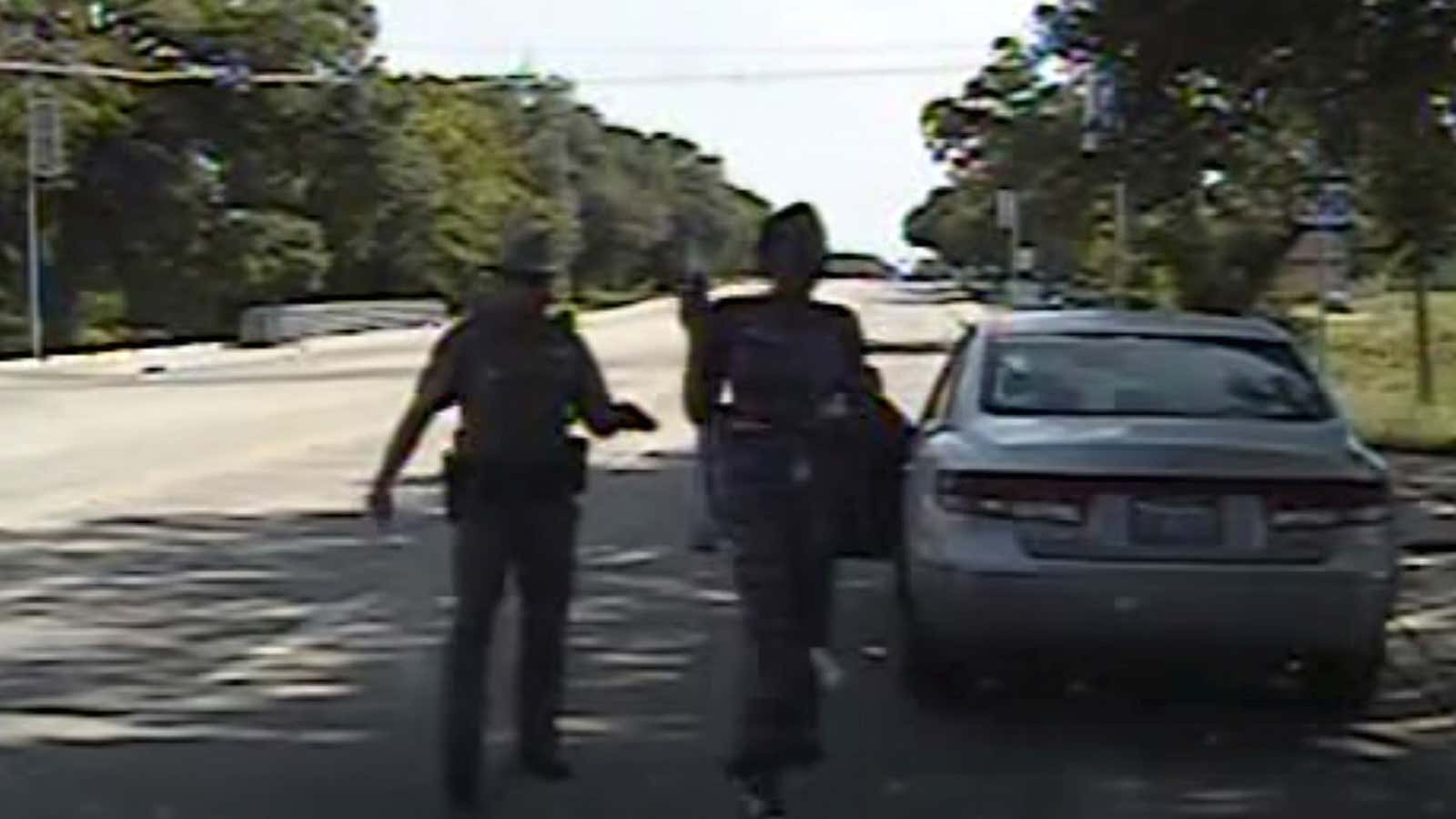This post has been updated.
On July 10, a young woman named Sandra Bland was pulled over on a Texas roadway by trooper Brian Encinia. Encinia accused Bland of allegedly failing to signal correctly when changing lanes, a minor traffic offense. The confrontation quickly escalated, beginning when Encinia asked Bland to put out her cigarette—which she was not lawfully required to do—and ending with the 28-year-old motorist on the ground in handcuffs. Three days later, Bland was found dead, hanging from a noose in her jail cell.
But it isn’t just Bland’s death, which is has been ruled a suicide but is still under investigation by the Texas State Troopers and the FBI, that has reignited a national debate about racial injustice. The traffic stop alone speaks to something black Americans, and minorities generally, have been arguing for decades: when it comes to dealing with the police, only white people are allowed to assert their Constitutional rights.
In the wake of Bland’s death, many have spoken passionately about the gulf of mistrust that exists between minorities and law enforcement. Activist and actor Jesse Williams highlighted the infuriating nature of this conversation in a particularly epic, 24-part social-media soliloquy on the police and racial inequality.
As experts like Jim Harrington, director of the Texas Civil Rights Project, have since asserted, Bland was well within her rights to decline to put out her cigarette in her own vehicle—and to demand a reason for being asked to leave that vehicle.
Over the years, there have been several examples of Americans insisting, both on camera and off, that those rights be acknowledged by police. Take this video shot by motorist Ryan Scott in Dekalb, Illinois. Scott, who appears from the footage to be Caucasian, is ultimately allowed to continue on his way. His video meanwhile was viewed over 900,000 times on YouTube, and he was lauded as a model citizen, bravely standing up for his rights against an overzealous officer.
Which brings us back to Williams, who has earned something of a reputation for his eloquent Twitter commentary on racial inequality. His tweets honed in on an important, if underreported truth about media narratives and bias.
Witness the self-described ”patriots” like Nevada rancher Cliven Bundy, who marshaled a militia to protect him from “overreaching” federal law enforcement officials. Not only was Bundy, a white man, unharmed by law enforcement, he was hailed as a hero by small-government advocates like Janine Hansen, a candidate for Congress from Nevada’s 2nd congressional district.
He was met with similar treatment in the conservative media, where many were so quick to side with law enforcement after the high-profile killings of black men like Freddie Gray or Eric Garner, and where many have consistently argued that there is no such thing as white privilege.
Over at Slate, Jamelle Bouie notes that the trooper, Encinia, entered a legal grey area when he made a series of fateful decisions—to pull someone over for a minor infraction, to escalate the situation over a lit cigarette, to threaten and finally arrest Bland. “If you are inclined to blame Bland for her arrest (and by extension her death), then you’re sanctioning an America where police command total deference, where you have to obey regardless of what you’ve done or what’s the law,” Bouie writes.
Do Americans want a society in which the police have unchecked authority? Cliven Bundy certainly would say no, as would Thomas Jefferson—and countless other white Americans who have had the privilege of both creating and then protesting public policy. Sandra Bland was not white, and now she is dead. Only the incredibly ignorant can afford to continue to claim this is coincidence.
Update (July 24): This post has been updated to reflect the most recent autopsy report, which ruled Bland’s death a suicide.
